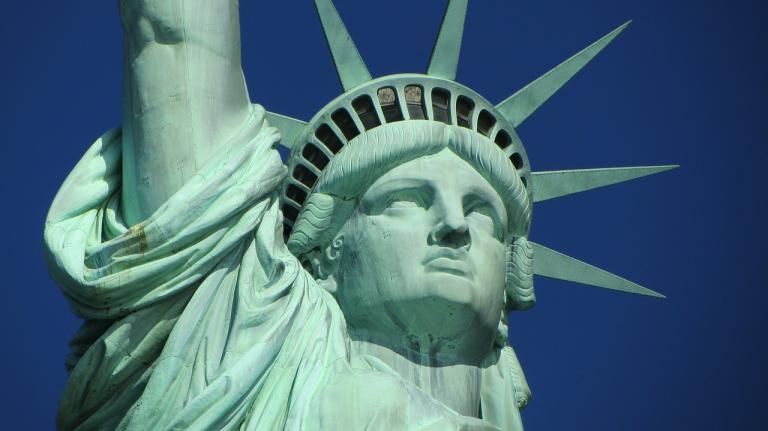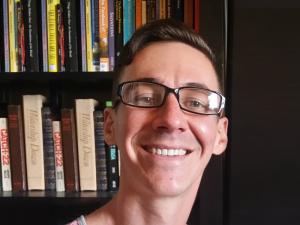
All cultures and societies use myth to tell their stories, and by myth I don’t mean the stories aren’t true in some way. Myths are often quite true for the people who create them. In fact, they are so true that to challenge them is to challenge the group identity. French anthropologist and literary critic René Girard goes so far as to say that myth is one of the three key pillars a culture needs in order to even be considered a culture (the other two being ritual and prohibition).
There is, however, a problematic catch-22 at play here: myth papers over the truth of a society’s victimization. That’s one of its key components. Not for nothing, but as the old saying goes, dead men tell no tales.
In the United States of America, then, the myth we tell ourselves is that our country was not founded on racism, slavery, and genocide. And while many of us counter this view, just as many paper over it like decoupage—slowly covering the truth of just how insidious our collective sins have been. Either that, or we lie to ourselves and say that those things are so far in the past that they don’t impact today’s world—as if the ripples of a wave couldn’t have come from a rock since we can no longer see any direct evidence of one. In other words, because Black folks aren’t picking cotton on white plantations and Indigenous folks aren’t walking trails of tears, we’ve moved well past these terrible atrocities and now have a level playing field.
However, for those not blinded by the myth we tell ourselves, we plainly see the ripples of the impact that continue on and on—from Jim Crow to forced reservations to redlining to the failed drug war to the 13th Amendment to police brutality to private prisons and more. These are the ripples of slavery. These are the ripples of the slaughter of Indigenous people. These are the ripples of the truth that white America has been attempting to paper over for generations.
But thanks to so many people of color (along with allies who are mature and introspective enough to acknowledge the past and its impact on the present), the voices of our victims continue to tear apart the myth. This is what theologian James Alison might call “the intelligence of the victim” (though I’ve never heard him apply the term to this specific topic). Without the victim’s voice, the victimizers would simply continue to push the narrative that America’s past has been rectified and that everything is on the up and up. Again though, this is the mythic narrative that’s a tale as old as time, and one that doesn’t go away so easily.
This is why even today we have so many white Americans pushing back against those who challenge our myths. They don’t see the ripples, nor do they want to see them. Our culture, our society, even our white colonial Christianity, is founded upon this myth, and without it, the whole system could crumble like a stool that loses one of its three legs. That’s why so many of them yell so loudly about the evils of “critical race theory” or “replacement theory,” or why so many of them feel the need to continue to celebrate Christopher Columbus, or even why they gravitate toward Black folks like Candace Owens and the artist formerly known as Kanye West. They need the myth to continue to hold power and influence.
Behaviorally, their predictability should not surprise us, however. If our cultures and societies need three “pillars,” to attack any of them is to attack all of them; to attack any of them is to attack what it means to be a part of the culture—whether that culture is white conservatism, Evangelicalism, Protestantism, Catholicism, matters not. They all have their own myths, their own rituals, and their own prohibitions, and in order to be included among them, you need to have all three. To be stripped of any is to be thrust into an existential crisis, and white conservatives are in such a crisis.
Because of these plain-as-day observations, I can assure you that if any of them are reading this, they will likely be having a visceral response and will already be coming up with an apologetic as to why I am wrong. Put simply: they need me to be wrong. If I’m right and that the mythic nature of their narrative involves a type of racism so systemic it undergirds the very foundation of their patriotism, then where could they go from here? They would have to reevaluate everything they think it means to be an American, perhaps even coming to a place where they would have to do the same with what it means to be a Christian. Because believe it or not, the white colonial Jesus that only exists in their myths is also very much at play here. In fact, given their hermeneutical lineage of justifying slavery and manifest destiny with the very words of Christ, it may all come down to Jesus.
For those on the other side of the aisle—those like myself who understand and comprehend the many atrocities that helped shape our nation and even our version of Christianity—what cannot be understated is our need to continue to listen to the voices of the victims—whether it’s victims of racism, sexism, homophobia, or, ideally (but sadly), folks in all three camps. Listen to Black folks. Listen to Indigenous folks. Listen to women and nonbinary folks. Listen to queer folks. And listen to white folks who can acknowledge the truths that have been for too long papered over by the mythical lie that this has ever been a country centered on freedom for all. Only then can we actually start to become such a country.
Also, if you’ve been digging my work on here, and want to see me be able to continue writing as close to full-time as humanly possible, please take a look at my Patreon page at www.patreon.com/mjdistefano. Even $1 a month helps bigly!!!














